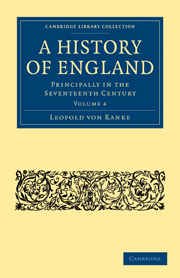Book contents
- Frontmatter
- Contents
- BOOK XVI THE LATER YEARS OF CHARLES II, 1675—1685 WHIGS AND TORIES
- BOOK XVII REIGN OF JAMES II, FEBRUARY 1685 TO SEPTEMBER 1688
- BOOK XVIII THE FALL OF JAMES II IN ITS CONNEXION WITH THE EUROPEAN CONFLICTS WHICH MARKED THE CLOSE OF 1688
- BOOK XIX COMPLETION OF THE REVOLUTION IN THE THREE KINGDOMS, 1688—1691
- INTRODUCTION
- CHAP. I William of Orange in London. Summoning of a Convention
- CHAP. II First sittings of the Convention. Debates on the vacancy of the Throne
- CHAP. III Elevation of the Prince of Orange to the English Throne. Constitutional limitations of the power of the Crown
- CHAP. IV James II in Ireland supported by help from France
- CHAP. V Dundee in the Scottish Highlands
- CHAP. VI Military events in Ireland in the year 1689
- CHAP. VII Dissensions in the Convention Parliament
- CHAP. VIII Dissolution of the Convention Parliament. First sittings of the Parliament of 1690
- CHAP. IX The Court at Dublin. Rivalry of the French and English Navies
CHAP. VIII - Dissolution of the Convention Parliament. First sittings of the Parliament of 1690
Published online by Cambridge University Press: 07 September 2011
- Frontmatter
- Contents
- BOOK XVI THE LATER YEARS OF CHARLES II, 1675—1685 WHIGS AND TORIES
- BOOK XVII REIGN OF JAMES II, FEBRUARY 1685 TO SEPTEMBER 1688
- BOOK XVIII THE FALL OF JAMES II IN ITS CONNEXION WITH THE EUROPEAN CONFLICTS WHICH MARKED THE CLOSE OF 1688
- BOOK XIX COMPLETION OF THE REVOLUTION IN THE THREE KINGDOMS, 1688—1691
- INTRODUCTION
- CHAP. I William of Orange in London. Summoning of a Convention
- CHAP. II First sittings of the Convention. Debates on the vacancy of the Throne
- CHAP. III Elevation of the Prince of Orange to the English Throne. Constitutional limitations of the power of the Crown
- CHAP. IV James II in Ireland supported by help from France
- CHAP. V Dundee in the Scottish Highlands
- CHAP. VI Military events in Ireland in the year 1689
- CHAP. VII Dissensions in the Convention Parliament
- CHAP. VIII Dissolution of the Convention Parliament. First sittings of the Parliament of 1690
- CHAP. IX The Court at Dublin. Rivalry of the French and English Navies
Summary
We have the report of an agent of James II as to his residence in London; it dates from the last months of 1689, during which the dissensions just mentioned made way and increased in violence. He received the impression that everything was ripe for the overthrow of the new government; ‘the country was ruined, the nobility discontented, the Church of England estranged by the treatment of the bishops, William III suspected of aiming at absolute power, and a combination against his supposed aims was being formed between Scots and Englishmen; if the government was still standing, the reason was, that it was not attacked speedily and energetically.’ So said William Penn, who was still a friend of James II, and travelled about the country at his personal risk, in order to confirm the adherents of that prince in their devotion to him. We are astonished when we become more familiar with the Jacobite movements of which Preston and Dartmouth then formed the centre. Dartmouth offered to carry over a part of the English fleet to the French. He had, he said, already gained over a part of the officers and crews by saying to them that the Dutch were more their enemies than the French; for that Louis XIV acted from generosity, while Holland had only its mercantile interest in view, which it pushed to the injury of the English. Dartmouth sought to arrange good terms beforehand for the officers and crews, as well as for himself.
- Type
- Chapter
- Information
- A History of EnglandPrincipally in the Seventeenth Century, pp. 579 - 588Publisher: Cambridge University PressPrint publication year: 2010First published in: 1875



